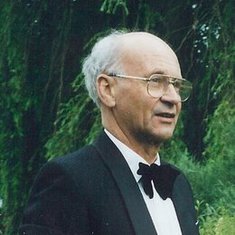 Dr. Brian Meldrum, a distinguished laboratory investigator, whose scientific career was devoted to studies of the mechanisms of action of antiepileptic drugs and to understanding the basis of the genetic epileptic photosensitivity seen in the Senegalese
baboon, Papio papio, died at his home in London on September 18, 2019.
Dr. Brian Meldrum, a distinguished laboratory investigator, whose scientific career was devoted to studies of the mechanisms of action of antiepileptic drugs and to understanding the basis of the genetic epileptic photosensitivity seen in the Senegalese
baboon, Papio papio, died at his home in London on September 18, 2019.
Dr. Meldrum received the BA and MA degrees from Cambridge University (Emmanuel College), and his MB and BChir from Guy’s Hospital Medical School. Later, he was the first graduate student to work with Professor Andrew F. Huxley at University
College London, who subsequently won the Nobel Prize for his pioneering studies of the ionic mechanisms involved in the control of excitability at neuronal membranes. In 1969, Dr. Meldrum worked in the laboratory of Dr. Robert Naquet in the
Department de Neurophysiologie in Marseilles. When he returned to London, he was appointed Honorary Clinical Assistant in the Department of Neurophysiology at the Hospital for Sick Children in Great Ormond Street.
In 1973, Dr. Meldrum began a long association with the Institute of Psychiatry and London University, and in 1975 was appointed Senior Lecturer in Neurology. Later that year, he spent a sabbatical at the Brain Research laboratory of Lund University
Hospital working with Professor B.K. Siesjo, and on returning to London was granted recognition as Teacher of the University in Neurology and Medicine at London University. In 1981, he was promoted to Senior Lecturer in the Department of Neurology
at London University, and in 1988 he was promoted to Professor of Experimental Neurology at the Institute of Psychiatry and University College London. He retired in 2000, as Professor Emeritus of Neurology.
Professor Meldrum was the author of more than 400 papers on epilepsy and ischemic cell injury. Among his many other commitments, Professor Meldrum was on the Editorial Board of Epilepsia (1976-1983, and again from 1994), as well as
on the Editorial Boards of Neurochemistry International (1981-1989), Archives Internationales de Pharmacodynamie et de Therapie (1985-1995), J Cerebral Blood Flow & Metabolism (1985-1996), Reviews in Neuroscience (1986-2000), Acta Neuropathologica (1986-2000), Molecular and Chemical Neuropathology (1990-2000), Neuropathology and Applied Neurobiology (1992-2000), Neuropharmacology (1993-2002), Functional Neurology (1990-2003),and Synapse (1990-2010). He
served as associate editor of Epilepsy Research (1985-1990) and later as managing editor (1991-2000). Professor Meldrum also edited or co-edited 18 books on epilepsy, clinical neurophysiology, brain hypoxia and primate models of
neurological disorders.
Not surprisingly, Dr. Meldrum received many honors for his work, including the William G. Lennox Award of the American Epilepsy Society (1980); the Michael Prize (jointly with Dr. C. Binnie, 1980/81); election to the American Neurological Association
(Corresponding Member, 1986); the K.A.C. Elliott Lecture at the Montreal Neurological Institute (1986); the Donald D. Mattson Lecture, Harvard Medical School (1994); a Doctor Honoris Causa degree from Université René
Descartes, Sorbonne (1994); the first Alfred Meyer Memorial Lecture, British Neuropathological Society, London (1995); the Epilepsy Research Award of the American Epilepsy Society (basic scientist, 1999); the Premio Anassilaos International Prize
for Neuroscience Research, Regio Calabria (2000); and the ILAE Award for Outstanding Contributions in Pharmacologic Development of Antiepileptic Drugs (2003). The ILAE elected him Ambassador for Epilepsy in 1987.
On a more personal note, Dr. Meldrum was a knowledgeable appreciator of music, especially opera, as well as a regular attendee of theatre and museums. He was an enthusiastic participant in the Winter Brain Conferences for several decades (including
the skiing). He shared all his interests with his wife and co-worker, Dr. Astrid Chapman, herself an accomplished neurochemist. From age 2, their daughter Hannah was also a frequent attendee of the international meetings in which Dr. Meldrum
participated until fairly recently. Dr. Meldrum is also survived by three children from his first marriage: Julian, Judith, and Andrew Meldrum.
Timothy A. Pedley, MD, FAAN, FEAN
The Neurological Institute of New York
Columbia University Medical Center